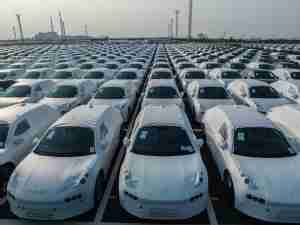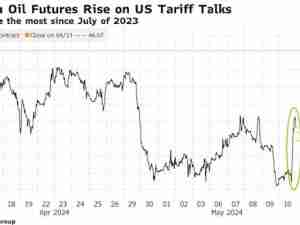Russia’s Putin Says He Welcomes Improved Israel-Turkey Ties
By: David Wainer | Jun 07 2016 at 01:30 PM | International Trade
Russian President Vladimir Putin said he welcomed improved relations between Israel and Turkey, suggesting that his own country’s strained ties with Ankara wouldn’t be an impediment to ending a six-year diplomatic rift.
At a Kremlin news conference with Israeli Prime Minister Benjamin Netanyahu, the two leaders pledged to work together to address regional challenges and pursue tighter trade ties, as their third Moscow meeting in less than a year highlighted warming relations.
Putin, in response to a question about rapprochement efforts between Israel and Turkey, said any improvement in international relations is good. Russia imposed economic sanctions on Turkey after it downed a Russian combat plane that approached Syria’s border with Turkey in November.
Turkey’s efforts to reconcile with Israel, a prospective gas exporter, have heated up since the faceoff with Russia, with officials on both sides saying an agreement is imminent. Turkish and Israeli diplomatic relations broke down in 2010 over an Israeli naval raid on a Turkish-led flotilla trying to breach Israel’s blockade of the Gaza Strip, which resulted in the deaths of 10 Turks.
Tighter Coordination
While Israel and Russia have squared off over Moscow’s involvement in Iran’s nuclear program and its deal to sell Tehran sophisticated S-300 air-defense systems, military coordination has tightened since Russia intervened on behalf of the Syrian government in its war against rebels last year. And as the U.S. and European allies seek to pressure Israel over its policies toward the Palestinians, Netanyahu has been looking to forge stronger economic and diplomatic ties with countries that want to tap Israel’s technological know-how and are less concerned about the Israeli-Palestinian conflict.
The closer relations stand in contrast to Netanyahu’s frosty relations with President Barack Obama, which have been strained by the U.S.-led nuclear deal with Iran and Israeli policies toward the Palestinians.
At the news conference, Netanyahu praised regional military coordination with Russia. Ahead of the visit, the prime minister’s office said the two leaders would discuss the implementation of Russian promises to help Israel block the transfer of weapons through Syria to Iran-backed Hezbollah militants in Lebanon.
Russia has been expanding its presence in the Middle East while the U.S. resists being drawn deeper into the region’s conflicts. Although Russia entered the Syrian civil war to prop up President Bashar al‑Assad, an ally of Iran and Hezbollah, its engagement with Israel shows it wants to be seen as a global power helping to reduce regional tensions, said Zvi Magen, a former Israeli ambassador to Russia and the Ukraine.
Restored Ties
“Russia is backing Assad, but Putin is cognizant of the fact that Israel is a regional power and that if he wants a greater regional role, positive relations with Israel are important,” said Magen, a senior research fellow at the Institute for National Security Studies in Tel Aviv. “Putin would like to be involved in Israel-Palestinian talks, so it’s important for him to be seen as a trusted partner.”
Israel has largely stayed out of the Syria conflict but has voiced fears that the Syrian-held section of the Golan Heights will become a launching pad for militant attacks against it. Netanyahu confirmed in April that Israel operates over the border to prevent Hezbollah from obtaining game-changing weapons, although officials have declined to comment on reports of Israeli involvement in specific attacks.
Netanyahu visited Moscow to mark 25 years since the restoration of ties between the former Cold War foes. Israeli exports to Russia have risen about 40 percent to $1.1 billion since Netanyahu took office again in 2009, and the two countries signed energy and agriculture deals during the visit.
Putin said he and Netanyahu gave “serious attention” to developing commercial ties, and that Israel and the Russian-dominated Eurasian Economic Union will begin talks on a free-trade zone this year. Cooperation on energy projects is possible, the Russian president added, without elaborating.








